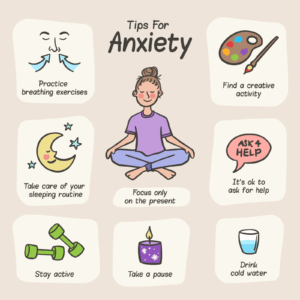Stress and Anxiety Treatment at Home: Effective Strategies for Finding Relief
In today’s fast-paced world, stress and anxiety have become common issues that affect millions of people worldwide. While seeking professional help is crucial for severe cases, there are several effective strategies you can try at home to manage and alleviate stress and anxiety. By incorporating these techniques into your daily routine, you can find relief and improve your overall well-being. This article will guide you through various methods and practices to help you combat stress and anxiety from the comfort of your own home.

1. Introduction
In this fast-paced world, stress and anxiety have become part of our daily lives. While some level of stress can be normal, excessive or prolonged stress can take a toll on our mental and physical well-being. Thankfully, there are various strategies and techniques you can implement at home to effectively manage and reduce stress and anxiety.
2. Understanding Stress and Anxiety
Stress is our body’s natural response to demanding situations, while anxiety is a persistent feeling of unease or fear. Both can have a significant impact on our overall health if not addressed properly. Understanding the root causes of stress and anxiety is the first step towards finding effective treatment options.
3. The Importance of Self-Care
Self-care plays a vital role in managing stress and anxiety. Taking care of yourself physically, emotionally, and mentally is essential for overall well-being. Partake in endeavors that bring forth both delight and serenity, such as indulging in hobbies, immersing yourself in nature, or engaging in introspection.
4. Deep Breathing Techniques
Deep breathing exercises are simple yet powerful techniques that can help reduce stress and anxiety. By focusing on your breath, you activate your body’s relaxation response and promote a sense of calm. Practice deep breathing exercises regularly, especially during moments of high stress or anxiety.
5. Mindfulness and Meditation
Mindfulness and meditation are practices that cultivate present-moment awareness and help you develop a non-judgmental attitude towards your thoughts and emotions. These practices have been shown to reduce stress and anxiety levels significantly. Allocate a small fraction of your daily routine to the practice of mindfulness or engaging in meditation exercises.
6. Regular Exercise and Physical Activity
Engaging in regular exercise and physical activity is not only beneficial for your physical health but also for your mental well-being. Physical activity releases endorphins, which are natural mood boosters, and helps reduce stress hormones. Find activities you enjoy, such as walking, jogging, dancing, or yoga, and incorporate them into your daily routine.
7. Healthy Diet and Nutrition
What you eat can have a significant impact on your mood and energy levels. Integrate a well-rounded eating plan that encompasses a variety of fruits, vegetables, whole grains, lean sources of protein, and nourishing fats into your daily dietary choices. Avoid excessive caffeine, sugary foods, and processed snacks, as they can contribute to feelings of anxiety and stress.
8. Journaling and Expressive Writing
Writing down your thoughts and feelings in a journal can be a therapeutic practice for managing stress and anxiety. Expressive writing allows you to release pent-up emotions and gain a better understanding of your inner self. Set aside time each day to write freely and without judgment.
9. Aromatherapy and Essential Oils
Aromatherapy, the use of scents and essential oils, can have a calming effect on the mind and body. Lavender, chamomile, and rosemary are examples of essential oils known for their relaxation properties. Use a diffuser or apply a few drops to your pillow or pulse points to experience their soothing benefits.
10. Herbal Remedies and Supplements
Certain herbs and supplements have been used for centuries to promote relaxation and reduce anxiety. Examples include chamomile tea, valerian root, and passionflower extract. However, consult with a healthcare professional before incorporating any herbal remedies or supplements into your routine.
11. Creating a Calming Environment
Your surroundings can greatly influence your stress levels. Create a calming environment at home by decluttering, organizing, and incorporating elements that promote relaxation. Use soft lighting, play soothing music, and surround yourself with comforting scents to enhance a sense of calmness.
12. Social Support and Connection
Maintaining social connections and seeking support from loved ones is crucial for managing stress and anxiety. Share your feelings with trusted friends or family members, join support groups, or consider professional counseling if needed. Knowing you have a support system can provide immense comfort during challenging times.
13. Limiting Screen Time and Digital Detox
Excessive screen time and constant exposure to digital devices can contribute to stress and anxiety. Take regular breaks from screens, practice digital detoxes, and engage in activities that do not involve electronic devices. Taking a break from technology enables your mind to find solace and regain its vitality.
14. Time Management and Prioritization
Effective time management and prioritization can help reduce feelings of overwhelm and stress. Break tasks into smaller, manageable steps, create to-do lists, and allocate specific time slots for different activities. Learning to prioritize and delegate tasks can also alleviate the burden and create a sense of control.
15. Seeking Professional Help
While self-help strategies can be effective for managing mild to moderate stress and anxiety, it’s important to seek professional help if your symptoms persist or worsen. A mental health professional can provide guidance, therapy, or medication options tailored to your specific needs.
Conclusion
Managing stress and anxiety at home is possible with the right strategies and practices. By incorporating self-care, relaxation techniques, healthy habits, and seeking support when needed, you can find relief and improve your overall well-being. Remember to prioritize your mental health and make self-care a priority in your daily life.
FAQs
2. How long does it take for stress and anxiety treatment at home to show results?
The timeline for experiencing relief from stress and anxiety may vary for each individual. Consistency and dedication to implementing the suggested strategies are key factors in achieving positive outcomes.
3. Are there any natural supplements for stress and anxiety?
Certain herbal remedies and supplements, such as chamomile tea, valerian root, and passionflower extract, have been traditionally used for their relaxation properties. However, it's important to consult with a healthcare professional before trying any new supplements.
4. Can journaling really help with stress and anxiety?
Yes, journaling can be a helpful tool for managing stress and anxiety. Writing down your thoughts and feelings allows for self-reflection, emotional release, and gaining a better understanding of your own experiences.
5. When should I consider seeking professional help for stress and anxiety?
If your symptoms persist, worsen, or significantly interfere with your daily functioning, it's advisable to seek professional help. A mental health professional can provide appropriate guidance, therapy, or medication options tailored to your specific needs.

1 thought on “Stress and Anxiety Treatment at Home”